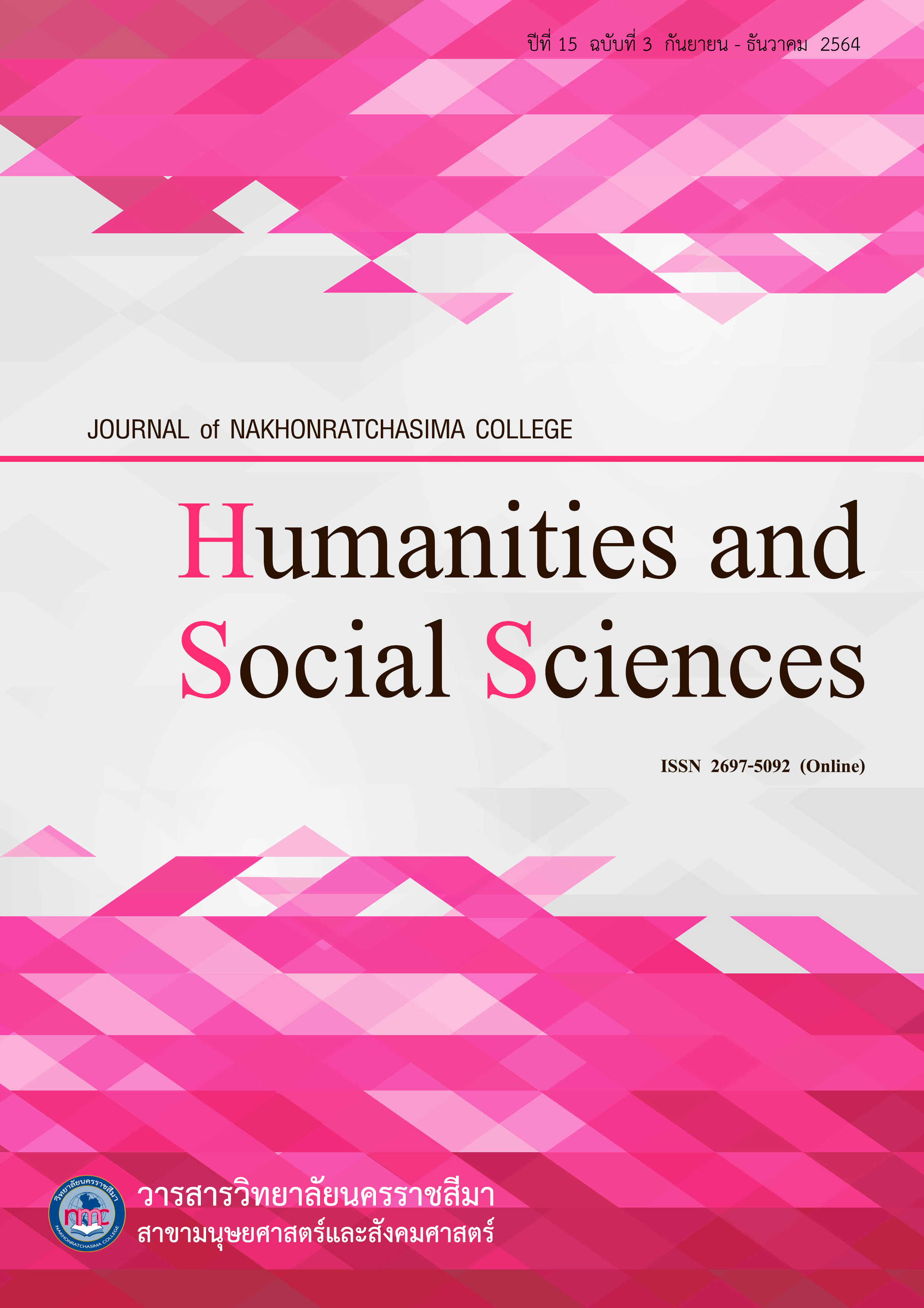การศึกษาความสัมพันธ์คาโนนิคอลระหว่างรูปแบบการเรียน และทักษะการเรียนรู้ตลอดชีวิตของนักเรียนชั้นมัธยมศึกษาตอนปลาย
A study of canonical correlation between learning styles and lifelong learning skills of high school students
คำสำคัญ:
รูปแบบการเรียน, ทักษะการเรียนรู้ตลอดชีวิตบทคัดย่อ
การวิจัยครั้งนี้มีวัตถุประสงค์ 1) เพื่อศึกษารูปแบบการเรียน และทักษะการเรียนรู้ตลอดชีวิตของนักเรียนระดับมัธยมศึกษาตอนปลาย 2) เพื่อวิเคราะห์ความสัมพันธ์คาโนนิคอลระหว่างรูปแบบการเรียน และทักษะการเรียนรู้ตลอดชีวิตของนักเรียนระดับมัธยมศึกษาตอนปลาย กลุ่มตัวอย่าง ได้แก่ นักเรียนชั้นมัธยมศึกษาตอนปลาย สังกัดสำนักงานเขตพื้นที่การศึกษามัธยมศึกษา เขต 18 จำนวน 441 คน ซึ่งได้มาจากการสุ่มตัวอย่างแบบสองขั้นตอน เครื่องมือที่ใช้ในการวิจัย ได้แก่ แบบสอบถามรูปแบบการเรียน และแบบทดสอบการเรียนรู้ตลอดชีวิต สถิติที่ใช้ในการวิเคราะห์ข้อมูล ได้แก่ ค่าเฉลี่ย ค่าส่วนเบี่ยงเบนมาตรฐาน และสหสัมพันธ์คาโนนิคอล
ผลการศึกษาพบว่า
- นักเรียนชั้นมัธยมศึกษาตอนปลาย มีการเรียนรู้แบบร่วมมือ แบบหลีกเลี่ยง และการเรียนรู้แบบอิสระ อยู่ในระดับมาก เรียนรู้แบบมีส่วนร่วม และเรียนรู้แบบแข่งขัน อยู่ในระดับปานกลาง เรียนรู้แบบพึ่งพา อยู่ในระดับน้อย มีทักษะการเรียนรู้ตลอดชีวิต ด้านความสามารถในการเรียนรู้ของผู้เรียน ความสามารถในการกำกับตนเอง ความสามารถในการเรียนรู้ร่วมกัน และความพร้อมรับการเปลี่ยนแปลง อยู่ในระดับมาก และแรงจูงใจใฝ่สัมฤทธิ์ ความใฝ่รู้ใฝ่เรียนในระดับปานกลาง
- แบบแผนความสัมพันธ์ระหว่างรูปแบบการเรียนกับทักษะการเรียนรู้ตลอดชีวิตของนักเรียนชั้นมัธยมศึกษาตอนปลาย มี 3 แบบแผน ชุดตัวแปรรูปแบบการเรียนสามารถอธิบายชุดตัวแปรด้านทักษะการเรียนรู้ตลอดชีวิตได้ร้อยละ 63.0, 18.0 และ 6.0 ตามลำดับ
เอกสารอ้างอิง
จิตต์ภิญญา ชุมสาย ณ อยุธยา. (2551). ลักษณะผู้เรียนรู้ตลอดชีวิตของนิสิตนักศึกษาปริญญาตรีชั้นปีสุดท้าย. วิทยานิพนธ์ปริญญาเอก. มหาวิทยาลัยศรีนครินทรวิโรฒ.
ชูศักดิ์ เอื้องโชคชัย. (2558). การพัฒนารูปแบบการส่งเสริมการเรียนรู้ตามอัธยาศัยเพื่อเสริมสร้างคุณลักษณะการเป็นบุคคลแห่งการเรียนรู้ตลอดชีวิตสำหรับเยาวชน. จุฬาลงกรณ์มหาวิทยาลัย, กรุงเทพฯ.
ณัฐดนัย ประภัสโรทัย. (2556). การศึกษาทักษะการเรียนเพื่อการเรียนรู้ของนักเรียนระดับ มัธยมศึกษาตอนปลาย. OJED, 8(2), น. 30-40.
ปรียาพร วงศ์อนุตรโรจน์. (2534). จิตวิทยาการศึกษา. กรุงเทพฯ: ศูนย์สื่อเสริมกรุงเทพฯ.
พาสนา จุลรัตน์. (2561). การจัดการเรียนรู้สำหรับผู้เรียนในยุคThailand 4.0. Veridian E-Journal, Silpakorn University, 11(2) น. 2363-2380
ไพฑูรย์ สินลารัตน์. (2559). การศึกษายุค 4.0 เป็นยิ่งกว่าการศึกษา. ศูนย์ตำราและเอกสารวิชาการ วิทยาลัยครุศาสตร์ มหาวิทยาลัยธุรกิจบัณฑิตย์.
วิชัย วงศ์ใหญ่. (2557). สี่เสาหลักของการศึกษา. จาก www.curriculumandlearning.com/upload/สี่เสาหลักทางการศึกษา_1400078221.pdf. สืบค้นเมื่อวันที่ 20 สิงหาคม 2563.
วีรพล แสงปัญญา. (2561). จิตวิทยาการเรียนการสอน. กรุงเทพฯ: สำนักพิมพ์แห่งจุฬาลงกรณ์มหาวิทยาลัย.
ศักรินทร์ ชนประชา. (2562). การเรียนตลอดชีวิต. วารสาร AL – NUR บัณฑิตวิทยาลัย, 14(26), น. 159-175
สิริอร วิชชาวุธ. (2554). จิตวิทยาการเรียนรู้. กรุงเทพฯ: สำนักพิมพ์หมาวิทยาลัยธรรมศาสตร์.
สุบิน ไชยยะ. (2558). กลยุทธ์การบริหารห้องสมุดมหาวิทยาลัยเพื่อเสริมสร้างทักษะการเรียนรู้ตลอดชีวิตของนิสิตนักศึกษา. กรุงเทพมหานคร : จุฬาลงกรณ์มหาวิทยาลัย.
สุรีรัตน์ ศรีบุญเรือง. (2550). การศึกษาปัจจัยบางประการที่สัมพันธ์กับความพร้อมในการเรียนรู้ด้วยการนำตนเองของนักศึกษาชั้นปีที่ 2 ในกลุ่มศูนย์สุขศาสตร์. มหาวิทยาลัยธรรมศาสตร์. ปริญญานิพนธ์การศึกษามหาบัณฑิต สาขาการวิจัย และสถิติทางการศึกษา. มหาวิทยาลัย ศรีนครินทรวิโรฒ.
สุวัฒน์ วัฒนวงศ์. (2546). การเรียนรู้ด้วยการนำตนเองของผู้เรียนการศึกษาต่อเนื่องสายอาชีพ. วิทยานิพนธ์ ศศ.ด. (อาชีวศึกษา). กรุงเทพฯ: บัณฑิตวิทยาลัย มหาวิทยาลัยเกษตรศาสตร์.
สุทธิวรรณ ตันติรจนาวงศ์. (2560). ทิศทางการจัดการศึกษาในศตวรรษที่ 21. วารสาร Veridian E- Journal, Silpakorn University, 10(12), น. 2843 - 2854
สำนักงานคณะกรรมการพัฒนาการเศรษฐกิจและสังคมแห่งชาติ. (2555). แผนพัฒนาเศรษฐกิจและ สังคมแห่งชาติ ฉบับที่11 พ.ศ. 2555-2559. [ออนไลน์]. สืบค้นจาก : http://www.nesdb.go.th/Portals/0/news/plan/p11/plan11.pdf (2562, 21 กรกฎาคม).
CHEGG. (2020). Cooperative Vs. Competitive Learning: To Group or Not to Group?, (Online),https://www.chegg.com/study-101/cooperative-vs-ompetitivelearning/
Evers ; Rush ; & Berdrow. (2010). Bases of Competence: An Instrument for Self and Institutional Assessment. Assessment & Evaluation in Higher Education. Vol. 35, No.4, 419 - 434
Grasha, A.F.(2002).Teaching with style. Retrieved July 20, 2018, from http://ilte.ius.edu/pdf/teaching_with_style.pdf
Grasha, A.F. & Reichman, S. (1975). Workshop handout on learning styles. Ohio: Faculty of Research Center, University of Cincinnati.
Kiley, M., and Cannon, R. (2000). Leap into Lifelong Learning. Retrieved July 20, 2018, fromhttp://digital.library.adelaide.edu.au/dspace/handle/2440/71214
Lewis, D. W. (2007). A Strategy for Academic Libraries in the First Quarter of the 21st Century. College & Research Libraries, 68(5),418-434.
McLaughlin, M.W. and Talbert, J.E. (2006). Building School Based Teacher Learning Communities: Professional Strategies to Improve Student Achievement. New York: Teachers College Press.
ดาวน์โหลด
เผยแพร่แล้ว
รูปแบบการอ้างอิง
ฉบับ
ประเภทบทความ
สัญญาอนุญาต
จรรยาบรรณผู้เขียนบทความ
ผู้เขียนบทความต้องรับรองว่าบทความนี้ไม่เคยตีพิมพ์ในวารสารใดหรือสิ่งพิมพ์อื่นๆ มาก่อน ต้องไม่คัดลอกผลงานผู้อื่นมาปรับแต่งเป็นบทความของตน และไม่ได้อยู่ระหว่างการเสนอเพื่อพิจารณาตีพิมพ์ อีกทั้งยอมรับหลักเกณฑ์การพิจารณาและการตรวจแก้ไขบทความต้นฉบับโดยกองบรรณาธิการวารสารวิทยาลัยนครราชสีมา สาขามนุษยศาสตร์และสังคมศาสตร์
บทความทุกเรื่องได้รับการตรวจพิจารณาทางวิชาการโดยผู้ทรงคุณวุฒิที่มีประสบการณ์และมีความเชี่ยวชาญตรงตามสาขาของบทความ ซึ่งผู้เขียนต้องแก้ไขตามคำแนะนำของผู้ทรงคุณวุฒิภายในระยะเวลาที่กำหนด หากไม่เป็นไปตามกำหนดกองบรรณาธิการขอสงวนสิทธิ์และยกเลิกการตีพิมพ์โดยจะแจ้งให้ทราบต่อไป
ข้อความที่ปรากฏในบทความของวารสารนี้เป็นความคิดเห็นของผู้เขียนซึ่งไม่เกี่ยวข้องกับวิทยาลัยนครราชสีมาแต่อย่างใด และกองบรรณาธิการขอสงวนสิทธิ์ในการพิจารณาและตรวจประเมินบทความเพื่อตีพิมพ์ในวารสารของวิทยาลัยนครราชสีมา สาขามนุษยศาสตร์และสังคมศาสตร์



